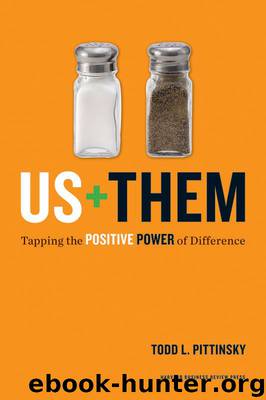Us Plus Them: Tapping the Positive Power of Difference (Leadership for the Common Good) by Todd L. Pittinsky

Author:Todd L. Pittinsky
Language: eng
Format: mobi
ISBN: 9781422177778
Publisher: Harvard Business Review Press
Published: 2012-07-30T14:00:00+00:00
Stunting Childhood Curiosity
What our future leaders learn—or don’t learn—in graduate school is important, but we all learn lifelong lessons about how to feel and think about the “other” much earlier in life. And once again, we can find examples of a well-meaning approach that is actually making it harder than necessary for us to achieve a successfully pluralistic world in which different groups live and work together, not only because they have to but because they want to.
For example, few of us would deliberately teach children to hate others who are different, but we might very well teach them to suppress their natural curiosity about others who are different. Yet curiosity about what makes others different may be a natural entry into positive attitudes toward different groups.
One day, as I was walking in a park with a friend who gets around in a motorized scooter due to a physical disability, a little boy came over and said, “Cool car! Can I hop a ride?” His mother grabbed his hand, gave it a rough squeeze, and snapped, “Jason, it’s not a car. Don’t bother her.” In doing so, she sent a clear signal that his curiosity was not appropriate. To this little boy—and to just about anyone—my friend, with her scooter and her legs curved from arthrogryposis multiplex congenita (a condition in which one’s lower limbs do not develop properly in the womb), was undeniably different. But what to make of this difference? To the boy’s mother, it was probably something to be pitied and definitely something not to be explored. Had her son approached a golfer in a golf cart or some people riding an electric cart in the airport—people who were neither “pitiable” nor very “different”—she probably would have found his boundary-crossing more permissible. But to the boy, my friend’s difference was not only interesting but actually inviting. Whatever it was about her, she got to ride around in this “cool car.” Yet the next time he sees someone so intriguingly different, he may keep to himself. Almost certainly he will have learned to do so by the time he is an adult. A chance to encourage the growth of allophilia, born of initial curiosity about difference, was certainly lost.
Earlier in life, when I worked at a child-care center, there was a single Jewish child, Rachel, in a class of some thirty preschoolers. The center provided lunch, but Rachel’s mother packed her a kosher meal. Children, I came to discover, love to reverse roles—to instruct adults. As I was serving lunch on my first day of work, one child after another eagerly informed me that I shouldn’t give one to Rachel—she couldn’t eat it. When I asked them why (Rachel happened to be playing elsewhere), they really had no idea—it was just something different and interesting about their classmate. Their teachers had never offered them an explanation, though it might have been a good opportunity to open up the subject of people’s different religions. It seemed that here, too,
Download
This site does not store any files on its server. We only index and link to content provided by other sites. Please contact the content providers to delete copyright contents if any and email us, we'll remove relevant links or contents immediately.
Rich Dad Poor Dad by Robert T. Kiyosaki(6612)
Bad Blood by John Carreyrou(6611)
Principles: Life and Work by Ray Dalio(6422)
Playing to Win_ How Strategy Really Works by A.G. Lafley & Roger L. Martin(6245)
Management Strategies for the Cloud Revolution: How Cloud Computing Is Transforming Business and Why You Can't Afford to Be Left Behind by Charles Babcock(4563)
The Confidence Code by Katty Kay(4251)
Thinking in Bets by Annie Duke(4218)
American Kingpin by Nick Bilton(3875)
Delivering Happiness by Tony Hsieh(3418)
Project Animal Farm: An Accidental Journey into the Secret World of Farming and the Truth About Our Food by Sonia Faruqi(3212)
The Power of Habit by Charles Duhigg(3128)
The Tyranny of Metrics by Jerry Z. Muller(3065)
Brotopia by Emily Chang(3049)
The Marketing Plan Handbook: Develop Big-Picture Marketing Plans for Pennies on the Dollar by Robert W. Bly(3047)
Mastering Bitcoin: Programming the Open Blockchain by Andreas M. Antonopoulos(3035)
I Live in the Future & Here's How It Works by Nick Bilton(2993)
The Content Trap by Bharat Anand(2917)
Building a StoryBrand by Donald Miller(2896)
Applied Empathy by Michael Ventura(2892)
